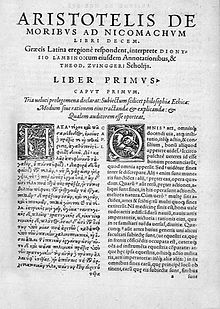Nicomachean Ethics (Q474537)
Jump to navigation
Jump to search
literary work by Aristotle
- Nichomachean Ethics
- Aristot. Nic. Eth.
| Language | Label | Description | Also known as |
|---|---|---|---|
| English | Nicomachean Ethics |
literary work by Aristotle |
|
Statements
Aristotelis De Moribus ad Nicomachum.jpg
730 × 1,025; 387 KB
730 × 1,025; 387 KB
1 reference
2022
0
『ニコマコス倫理学』(1556年刊・ギリシア語/ラテン語) (Japanese)
Aristotle Ethica Nicomachea page 1.png
394 × 596; 126 KB
394 × 596; 126 KB
First page in an 1837 edition (English)
Første side i en utgave fra 1837 (Norwegian Bokmål)
0 references
1 reference
4 references
ἴσως οὖν οὐ χεῖρον διορίσαι αὐτά, τίνα καὶ πόσα ἐστί, τίς τε δὴ καὶ τί καὶ περὶ τί ἢ ἐν τίνι πράττει, ἐνίοτε δὲ καὶ τίνι, οἷον ὀργάνῳ, καὶ ἕνεκα τίνος, οἷον σωτηρίας, καὶ πῶς, οἷον ἠρέμα ἢ σφόδρα. (Ancient Greek)
ísos oún ou cheíron diorísai aftá, tína kaí pósa estí, tís te dí kaí tí kaí perí tí í en tíni práttei, eníote dé kaí tíni, oíon orgáno, kaí éneka tínos, oíon sotirías, kaí pós, oíon iréma í sfódra. (Ancient Greek)
Perhaps then it will be as well to specify the nature and number of these circumstances. They are (1) the agent, (2) the act, (3) the thing [1] that is affected by or is the sphere of [2] the act; and sometimes also (4) the instrument, for instance, a tool with which the act is done, (5) the effect, for instance, saving a man's life, and (6) the manner, for instance, gently or violently.1. [17] / [1] / ‘Things’ seems to include persons, see example [3] below. / [2] / ἐν τίνι seems to bear a more limited sense than ἐν οἷς ll. 1, 16, 19, 24, which covers the circumstances of all sorts. / [3] / Aeschylus was accused before the Areopagus of having divulged the Mysteries of Demeter in certain of his tragedies, but was acquitted. A phrase of his, ‘It came to my mouth,’ became proverbial (Plat. Rep. 563c, etc.), and he may have used it on this occasion. (English)
p.5 / Therefore it is not a pointless endeavor to divide these circumstances by kind and number:(1) the who, (2) the what, (3) around what place or (4) in which time something happens,and sometimes (5) with what, such as an instrument, (6) for the sake of what, such assaving a life, and (7) the how, such as gently or violently. (English)
1 reference
Aristot. Nic. Eth.
Identifiers
1 reference
1 reference
Ethica Nicomachea
1 reference
1 reference
Aristotle. Nicomachean ethics
Aristotle. Ethica Nicomachea
Aristotle. Sefer ha-midot ʻal-shem Niḳomakhus
Aristotle. Aristotelis Ethica Nicomachea
1 reference
1 reference
1 reference
1 reference
Sitelinks
Wikipedia(41 entries)
- arwiki الأخلاق النيقوماخية
- azwiki Nikomax etikası
- bgwiki Никомахова етика
- bswiki Nikomahova etika
- cawiki Ètica a Nicòmac
- cswiki Etika Nikomachova
- cywiki Moeseg Nicomachaidd
- dawiki Den nikomakhæiske etik
- dewiki Nikomachische Ethik
- elwiki Ηθικά Νικομάχεια
- enwiki Nicomachean Ethics
- eowiki Etiko de Nikomaĥo
- eswiki Ética nicomáquea
- etwiki Nikomachose eetika
- fawiki اخلاق نیکوماخوسی
- fiwiki Nikomakhoksen etiikka
- frwiki Éthique à Nicomaque
- glwiki Ética a Nicómaco
- hewiki האתיקה של אריסטו
- hiwiki निकोमेकियन नीतिशास्त्र
- hrwiki Nikomahova etika
- idwiki Ethika Nikomakheia
- iswiki Siðfræði Níkomakkosar
- itwiki Etica Nicomachea
- jawiki ニコマコス倫理学
- kowiki 니코마코스 윤리학
- lawiki Ethica Nicomachea
- ltwiki Nikomacho etika
- nlwiki Ethica Nicomachea
- nowiki Den nikomakiske etikk
- plwiki Etyka nikomachejska
- ptwiki Ética a Nicômaco
- rowiki Etica Nicomahică
- ruwiki Никомахова этика
- shwiki Nikomahova etika
- slwiki Nikomahova etika
- svwiki Den nikomachiska etiken
- ukwiki Нікомахова етика
- uzwiki Nikomax axloqi
- viwiki Nicomachean Ethics
- zhwiki 尼各马可伦理学
Wikibooks(1 entry)
Wikinews(0 entries)
Wikiquote(2 entries)
- bswikiquote Nikomahova etika
- iswikiquote Siðfræði Níkomakkosar
Wikisource(5 entries)
- elwikisource Ηθικά Νικομάχεια
- enwikisource Nicomachean Ethics
- eswikisource Ética a Nicómaco
- euwikisource Nikomakorentzako etika
- frwikisource Éthique à Nicomaque

